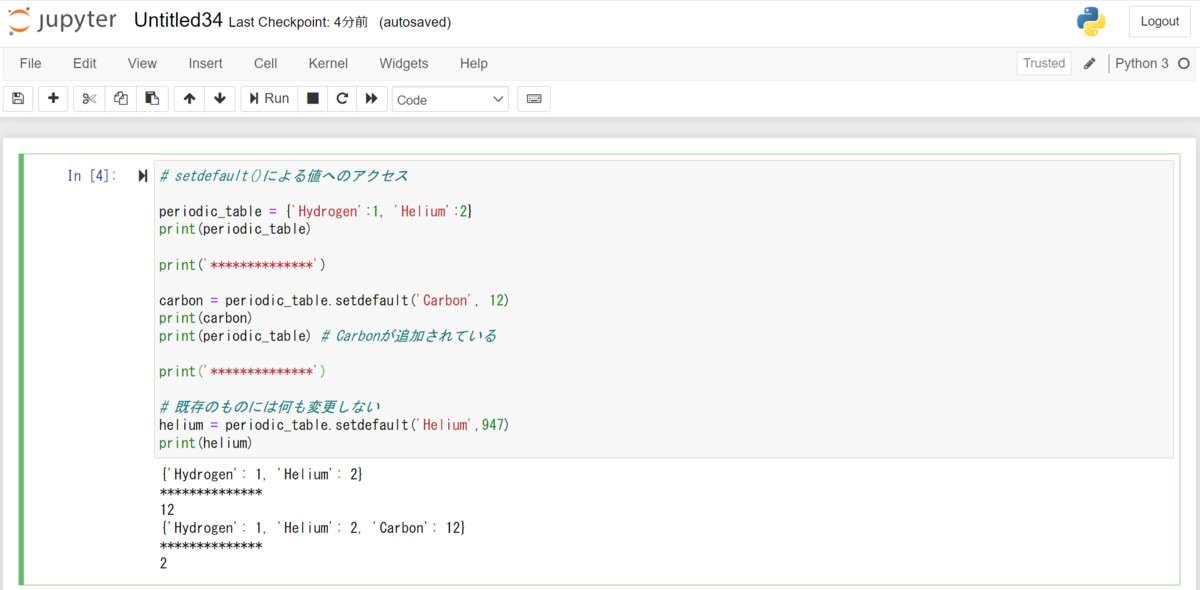Pythonを真面目にゆっくり学ぶべく
を参考に学んでいきます*1。
前回
5. Pyの化粧箱:モジュール、パッケージ、プログラム
で現実的な大規模プログラムを書くための方法を学ぶ。
5.2 パッケージ
アプリケーションを大規模にするために、モジュールはパッケージと呼ばれる階層構造に組織することができる。
# メインプログラム:boxes/weather.py from sources import daily, weekly print("Daily forecast:", daily.forecast()) print("Weekly forecast:") for number, outlook in enumerate( weekly.forecast(),1): print(number, outlook) # モジュール1:boxes/sources/daily.py def forecast(): return 'like yesterday' # モジュール2:boxes/sources/weekly.py def forecast(): return ['snow','more snow','sleet','freezing rain','rain','fog','hail']
5.3 Python標準ライブラリ
には標準ライブラリがあり、コア言語が膨れ上がるのを防ぐべく別に管理されている。
5.3.1 setdefault()とdefaultdict()による存在しないキーのアクセス
辞書に対して存在しないキーでアクセスすると例外が生成される。例外を防ぐには関数を用いるが、他に
関数を用いると、もし存在しないキーでアクセスした場合にそのキーと予め別の引数で与えた値を新たに要素として追加する。
# setdefault()による値へのアクセス periodic_table = {'Hydrogen':1, 'Helium':2} print(periodic_table) print('**************') carbon = periodic_table.setdefault('Carbon', 12) print(carbon) print(periodic_table) # Carbonが追加されている print('**************') # 既存のものには何も変更しない helium = periodic_table.setdefault('Helium',947) print(helium)

### defaultdict # 新しいキーに対して予めデフォルト値を与えておく from collections import defaultdict periodic_table = defaultdict(int) periodic_table['Hydrogen'] = 1 print(periodic_table['Lead']) print(periodic_table['sodium']) print(periodic_table)
5.3.2 Counter()による要素数の計算
# Counter from collections import Counter breakfast = ['spam', 'spam', 'eggs', 'spam'] breakfast_counter = Counter(breakfast) # most_common():全ての要素を降順で返す breakfast_counter.most_common() breakfast_counter.most_common(1) # counterは各種演算子で結合できる lunch = ['eggs','eggs','bacon'] lunch_counter = Counter(lunch) print(breakfast_counter + lunch_counter) print(breakfast_counter - lunch_counter) print(breakfast_counter & lunch_counter) print(breakfast_counter | lunch_counter) # 和集合だと共通する要素の数はより多い方を採用する
5.3.3 OrderedDict()によるキー順のソート
# OrderedDict()辞書のキーに順序を与える from collections import OrderedDict quotes = OrderedDict([ ('Moe','A wise guy, huh?'), ('Larry','Ow!'), ('Curly', 'Nyuk nyuk!'), ]) for stooge in quotes: print(stooge)
*1:第2版が出ているものの初版しか持っていないのでこちらで。
